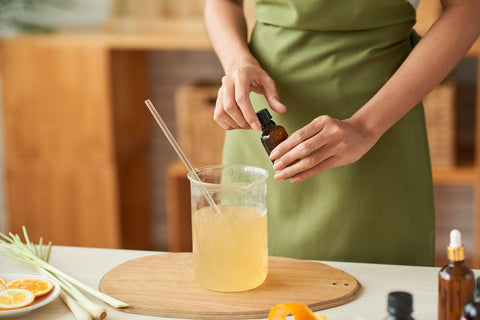Acne is a common skin problem that is increasing in young women day by day. It is a persistent and frustrating skin problem for many people. While there is a variety of over-the-counter acne treatments available, some people prefer to use natural and homemade remedies that can help them tackle their skin concerns.

One such remedy is making homemade acne soap using natural ingredients. In this blog, we will discuss some easy and effective soap recipes for acne-prone skin. All these soap recipes can help cleanse and soothe the skin, reduce inflammation, and prevent further breakouts. So, if you are looking for a natural solution to acne, then keep reading to learn how to make homemade acne soap.
Top 5 Soaps For Acne Prone Skin
Acne-prone skin can be a frustrating and difficult issue to manage. It is very important to choose the right soap to cleanse the skin without irritating it further. Here are five of the best soaps for acne-prone skin that you must have:
1.) Charcoal Tea Tree Soap For Acne Prone Skin
Charcoal tea tree soap contains activated charcoal that helps to draw out impurities from the skin.

Tea tree oil provides antibacterial and antifungal properties. Altogether these ingredients help to unclog pores and then reduce acne breakouts.
2.) Neem Tulsi Soap For Acne Prone Skin
Due to their antibacterial and anti-inflammatory characteristics, neem and tulsi have been utilized in Ayurveda medicine for ages. This soap helps to calm the skin, lessen skin inflammation and redness, and minimize acne breakouts.
3.) Clay Facial Soap For Acne Prone Skin
Clay is a popular natural ingredient that helps to absorb the excess oil and dirt from the skin. Therefore it makes an excellent ingredient for acne-prone skin. This soap contains other natural clay ingredients that help to detoxify and unclog pores while providing gentle exfoliation.
4.) Aloe Vera Soap For Acne Prone Skin
Aloevera is known for its soothing and healing properties. It is a specifically helpful ingredient for acne-prone skin.

The soap helps to reduce inflammation and redness associated with acne while also moisturizing the skin.
5.) Rosemary Soap For Acne Prone Skin
Rosemary has natural antimicrobial properties and is also rich in antioxidants. The soap is known to reduce the appearance of acne breakouts and promotes a clearer complexion. In addition to that its antioxidant content also reduces acne marks.
Homemade Soap Recipe For Acne Problems
Acne can be a frustrating and persistent skin problem. So, in order to get rid of that nothing could be better than trusting a homemade soap that you make on your own. So, if you are looking for a natural solution to acne, keep reading to learn how to make homemade acne soap.
Ingredients:
- Lye (Sodium Hydroxide) - 136 Grams
- Water - 344 Grams
- Coconut Oil - 317 Grams
- Olive Oil - 226 Grams
- Aloe Butter - 90 Grams
- Lard - 272 Grams
- Tea Tree Essential Oil - 10 Drops
- Activated Charcoal Powder - 1 Gram
Instructions:
Step 1: Both the lye and the water should be measured out and placed in separate containers. The next portion can get quite hot, and glass could break, so make sure neither of these containers is made of biodegradable material like plastic or silicone. I'd recommend using stainless steel instead.

Step 2: Relocate if you are not already near an open window or a fan or another source of ventilation. Make sure you're wearing the appropriate safety gear; gloves and goggles are required, but I'd advise wearing long sleeves, full-length pants, and closed-toed shoes.
Step 3: Stirring constantly, gradually add the lye to the water, not the other way around. Avoid leaning directly over the bowl when mixing. It's okay to pour some lye, stir it, and then repeat. You don't have to pour the lye continuously. As the mixture becomes foggy, stir it again until it is clear. Leave it alone. After you have enough space to accommodate the entire yield, combine your oils in one cooking unit and heat them until they are completely melted.
Step 4: Now you may gradually stir your lye solution—a mixture of lye and water—into the melted oils. From this point, you can either make cold-process or hot-process soap. The amount of time you have to wait before using the soap differs between these two. While the cold process can't be used for at least two weeks, but ideally up to a month, the hot procedure can be used right away but doesn't look nearly as great.

Step 5: Stir the mixture until it resembles a very thick pudding if you want to use it straight soon. If you want a gorgeous soap and don't mind waiting, stir the soap until it is just thick enough to pour some on top without it immediately settling back into the mixture. When the mixture has reached the desired consistency, add the charcoal powder and tea tree oil, making sure to evenly distribute them.
Step 6: You can use any type of mold for your combination aside from tin, so take your soap and pour it into the mold you have ready. If you decided to use your soap right away, you can do so as soon as it hardens, which should take a few hours. The second sort must remain out and cure for a further two to four weeks after completely hardening, which takes at least 24 to 48 hours.
Conclusion
In conclusion, we can say that homemade soaps are the best solution for acne-prone skin. After all homemade soaps are becoming increasingly popular because they offer several benefits over commercial soaps. There are many reasons why trusting homemade soaps can be the best option.
With homemade soap, you also have control over the ingredients and can customize the formulation to meet your specific skin needs. In the end, we have to realize that homemade soaps offer a more personalized and natural approach to skincare which can lead to clearer and healthier skin.
Frequently Asked Questions
Welcome to our comprehensive FAQ section on Soap Recipe For Acne!
Q. How do You Make Homemade Acne Soap?
A. There are many homemade acne soap recipes you can follow to make the homemade soap of your choice.
Q. Which Homemade Soap is Best for Pimples?
A. Aloe vera and rosemary soap are best for pimples as it does not rob your skin of its moisture.
Q. What Ingredients are Good for Acne Soap Making?
A. Vegetable oils, tea tree oil, lavender, peppermint, cinnamon camphor bark oil, black pepper, peppermint, eucalyptus globulus leaf oil, and hundreds of other oils include aromatherapy components that can be used to soothe, moisturize, and comfort the skin on your feet.











 Sign in
Sign in Register now
Register now My Reward Points
My Reward Points









